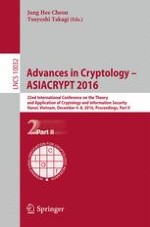2016 | OriginalPaper | Buchkapitel
Constant-Round Asynchronous Multi-Party Computation Based on One-Way Functions
verfasst von : Sandro Coretti, Juan Garay, Martin Hirt, Vassilis Zikas
Erschienen in: Advances in Cryptology – ASIACRYPT 2016
Verlag: Springer Berlin Heidelberg
Aktivieren Sie unsere intelligente Suche, um passende Fachinhalte oder Patente zu finden.
Wählen Sie Textabschnitte aus um mit Künstlicher Intelligenz passenden Patente zu finden. powered by
Markieren Sie Textabschnitte, um KI-gestützt weitere passende Inhalte zu finden. powered by

